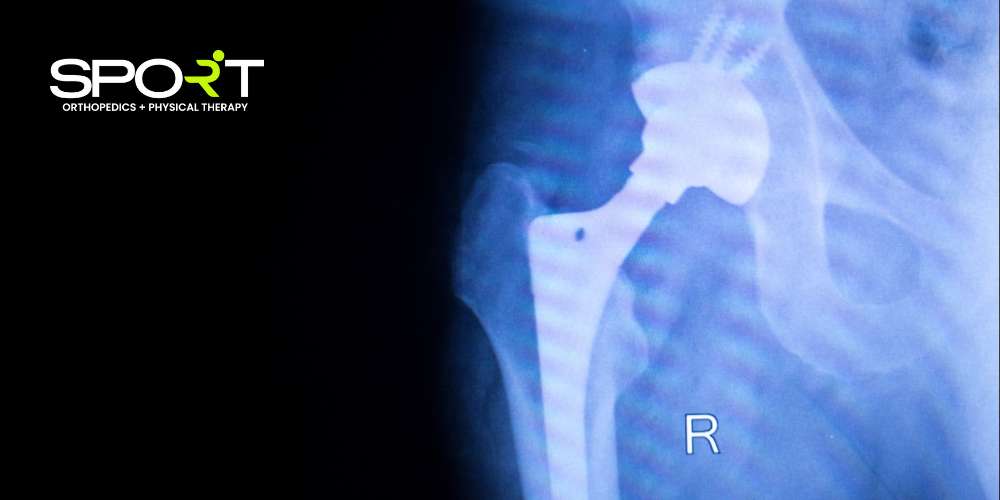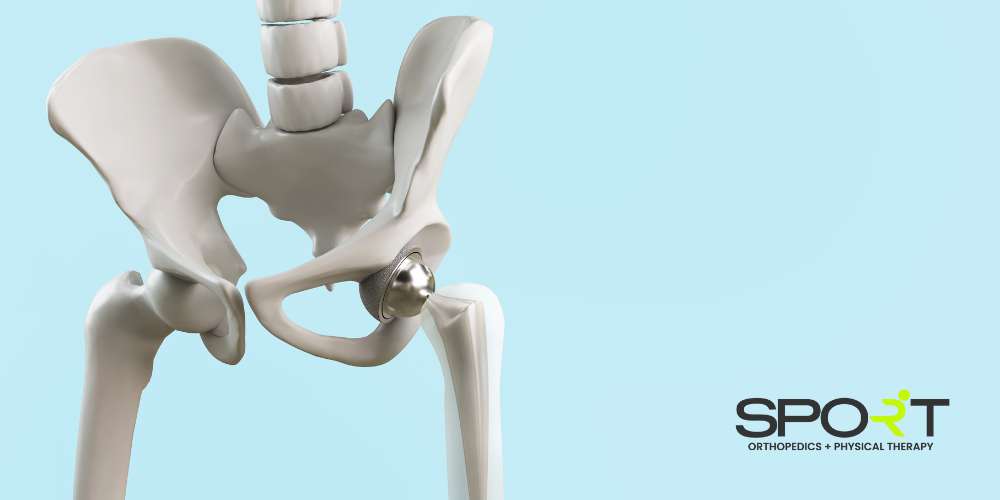Hip Replacement Surgery Frisco, TX
Hip Replacements in Frisco, TX
Home » Hip Replacement Surgery Frisco
If you’re living with chronic hip pain or limited hip mobility, you’re not alone. Countless individuals suffer from various hip conditions that make running, walking, bending down, or even resting painful. Luckily, hip replacement surgery can provide long-lasting relief for individuals suffering from debilitating hip conditions such as osteoarthritis, rheumatoid arthritis, or hip fractures.
At SPORT Orthopedics + Physical Therapy, we specialize in advanced hip replacement techniques, including total, partial, anterior, and posterior hip replacements. Our Frisco hip replacement surgeons combine state-of-the-art technology with evidence-based practices to ensure the best possible outcome, every single time.
Let us help you live pain-free–call (469) 200-2832 to schedule an initial appointment with a sports and orthopedic specialist on our team.
What Is Hip Replacement Surgery?
Hip replacement surgery, also called total hip arthroplasty, is a surgical procedure performed to replace a damaged or diseased hip joint with a hip prosthesis (artificial hip). Like with any other kind of joint replacement surgery, the prosthetic components mimic the natural structure and function of the hip joint, allowing for smoother movement and reduced pain.
The hip is what’s called a “ball and socket” joint, with the ball being the femoral head (the top of the femur) and the socket being the hip socket. In a hip replacement surgery, these damaged parts of the joint are removed and replaced with prosthetic components, which are usually made of metal, plastic, and ceramic materials.

This kind of surgery is often performed at an orthopedic hospital or surgery center and can treat a variety of hip conditions and help relieve pain. However, like any surgical procedure, a hip replacement can carry certain risks. Individuals who are considering hip replacement should speak to an experienced orthopedic surgeon to discuss the benefits, risks, and expectations for the procedure.
What Conditions Can Hip Joint Replacement Surgery Treat?
There are a few debilitating hip conditions that can lead to chronic pain, stiffness, and limited mobility, which can negatively impact a person’s quality of life. Hip replacement surgery may be used to address these conditions, especially when other treatment options fail to provide patients with relief. Below are some of the most common conditions that can be treated with hip joint replacement surgery.
Hip Pain
Persistent hip pain can significantly impact daily activities and overall quality of life. Hip replacement surgery offers relief for those suffering from chronic hip pain, especially when that pain limits their mobility and affects their ability to perform routine tasks comfortably
Osteoarthritis
Osteoarthritis is a type of arthritis that causes the cartilage within a joint to break down, which can then cause the bones in the joint to scrape against one another. This can lead to pain, stiffness, and reduced range of motion in the joint. Those with hip osteoarthritis may want to consider undergoing hip replacement surgery, especially if conservative measures like medication and physical therapy have failed to provide adequate relief.
Fractures
Hip fractures, which are often caused by falls or hip trauma, can cause severe pain and can limit mobility, especially in older adults. Hip replacement surgery can replace the fractured parts of the hip joint with prosthetic components, stabilizing the joint, relieving pain, and facilitating better mobility.

Average Age for Hip Replacement in Frisco
The average age for hip replacement surgery in Frisco, Texas, typically ranges between 50 and 80 years old. While hip replacement surgery is more commonly associated with older adults due to age-related degenerative conditions, it can also be performed on younger patients, especially those who have experienced hip trauma or have a congenital hip disorder.
Types of Hip Replacement Surgery
There are a few different kinds of hip replacement surgeries that people can choose to undergo, depending on the severity of their hip condition and their goals for their procedure. Below are some of the different kinds of hip replacement surgeries we perform at SPORT Orthopedics + Physical Therapy in Frisco, TX.
Total Hip Replacement Surgery
Total hip replacement surgery involves replacing both the femoral head and the acetabulum (hip socket) with prosthetic components. This procedure is commonly performed to address advanced osteoarthritis, rheumatoid arthritis, or other conditions causing significant hip joint damage.
Partial Hip Replacement Surgery
Partial hip replacement surgery, also known as hip hemiarthroplasty, involves replacing only the damaged or diseased portion of the hip joint, typically the femoral head, rather than the whole joint. This procedure is often performed in cases of hip fractures, where the femoral head is fractured but the acetabulum remains intact.
Anterior Hip Replacement Surgery
Anterior hip replacement surgery is an approach that involves accessing the hip joint from the front of the body, as opposed to the traditional posterior approach. This kind of minimally invasive hip replacement allows the surgeon to access the hip joint by moving hip muscles aside rather than cutting through them, potentially leading to quicker recovery and less postoperative pain.
Posterior Hip Replacement Surgery
Posterior hip replacement surgery is a traditional approach where the surgeon accesses the hip joint from the back of the body. This method involves making an incision through the muscles and tissues at the back of the hip to reach the joint. While posterior hip replacement surgery may require a longer recovery period compared to other approaches, it still remains widely used and often results in successful patient outcomes.

Hip Replacement Symptoms
Individuals in need of hip replacement surgery may experience a range of symptoms related to hip joint degeneration or damage. Common symptoms include:
- Persistent hip pain
- Stiffness and limited range of motion
- Reduced mobility
- Hip joint instability
- Swelling and inflammation
- Hip joint clicking or grinding
- Pain or discomfort at rest
These symptoms may vary in severity, depending on the underlying cause of the hip joint degeneration. Consult with an orthopedic surgeon to determine the most appropriate treatment for your chronic hip pain, limited mobility, and other symptoms.
Will an X-Ray Show If I Need a Hip Replacement?
A hip X-ray can provide visual confirmation of hip joint instability, but it likely will not be able to determine whether or not you need a hip replacement. That decision is typically made after a comprehensive evaluation by an orthopedic surgeon, including a review of symptoms, a physical examination, and additional imaging studies such as MRI or CT scans.
What Is Normal Pain After Hip Replacement Surgery?
After hip replacement surgery, it’s normal for patients to suffer from mild to moderate pain or discomfort at the surgery site, which will gradually decrease over time. In the first few weeks after surgery, patients will likely experience pain, soreness, or stiffness in the hip joint and the surrounding tissues, especially when moving or engaging in weight-bearing activities.
Adequate pain management strategies, including medications, physical therapy, and proper rest, are typically prescribed to help manage postoperative pain and facilitate recovery.
However, if you experience severe pain or worsening pain after your hip replacement surgery, contact your surgeon as soon as possible. You may require further evaluation to ensure your hip implant is functioning as it should.
How Long Does Hip Replacement Surgery Take?
Hip replacement surgery typically takes approximately 2 hours to complete, depending on the type of hip replacement being performed and the complexity of the hip injury or condition being treated. After surgery, patients are typically monitored in the recovery room for a few hours before being transferred to a hospital room or being discharged home.

Hip Replacement Recovery Time
Hip replacement recovery can take several weeks, depending on the extent of the replacement, the type of surgical technique used, and the age of the patient, among other factors. In the initial weeks following surgery, patients will focus on managing their pain, caring for their surgical wounds, and gradually increasing their mobility, usually by seeing a physical therapist.
Most patients can resume light activities within a few weeks, but it may take several months to fully relieve pain in their hip and to regain strength, range of motion, and function in their hip joint. Adhering to postoperative instructions, including physical therapy exercises, activity modifications, and follow-up appointments, is crucial for a successful recovery.
At SPORT Orthopedics + Physical Therapy, our Frisco physical therapists are here to help ensure you’re able to completely recover from your joint recovery.
How Long Does a Hip Replacement Last?
Generally, modern hip replacements are designed to last 15 to 20 years or more, with many patients experiencing long-term success with their hip implants. However, some individuals may require revision surgery to replace worn-out components or address complications, like hip implant loosening or infection.
Lifetime Precautions After Hip Replacement
While hip replacement is designed to restore mobility and function to the hip, there are certain things that you should not do after hip replacement surgery to minimize the risk of complications. This includes avoiding high-impact activities such as running or jumping, which can put excessive stress on the implant.
Additionally, maintaining a healthy weight and engaging in low-impact exercises like walking, swimming, or cycling can help preserve joint function and longevity. Practicing proper body mechanics and avoiding excessive bending or twisting motions can also help prevent implant dislocation.
In order to preserve the long-term health of your partial or total hip replacement, be sure to attend all follow-up appointments and adhere to these activity restrictions.
How Long After Hip Replacement Can I Tie My Shoes?
Typically, patients should wait 6-8 weeks before engaging in activities like tying their shoes. In the meantime, use shoes that are easy to slip on, use adaptive devices like shoe horns, or have a caregiver tie your shoes for you.
Contact SPORT Orthopedics + Physical Therapy for Hip Replacements in Frisco
If your hip joint is decreasing your quality of life, you may want to consider partial or total hip replacement. At SPORT Orthopedics + Physical Therapy, our orthopedic surgeons and physical therapists are dedicated to providing personalized treatment plans tailored to your unique needs and goals.
We understand how debilitating joint conditions like osteoporosis can be, which is why we offer a variety of hip and knee replacement surgeries for the residents of Frisco and beyond. Whether you’re experiencing hip pain from osteoarthritis or seeking relief from a hip fracture, we’re here to help guide you through the process and get you on the path to recovery.
We want to help you get your life back, so call us at (469) 200-2832 to schedule an appointment with us.


